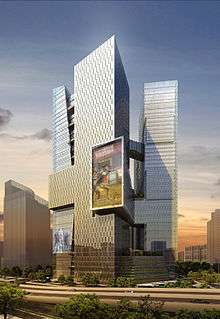Wong Tung & Partners
Wong Tung & Partners is an international architecture, planning and design firm established in Hong Kong in 1963. It has offices in Hong Kong, Beijing, Shanghai, Shenzhen and Chongqing.
| Industry | Architecture |
|---|---|
| Founded | 1963 |
| Headquarters | , |
| Services | Architecture, Interior Design, Urban Design and Planning |
Number of employees | 400+ |
| Website | www |

Wong Tung & Partners provides multi-disciplinary services in architecture, interiors, planning and urban design. The firm has over 250 architectural professionals and personnel in Hong Kong and more than 150 staff in Mainland China. Their projects include Urban Design and Planning, Large Scale Mixed Use Developments, Super Highrises, Large Scale Residential Developments, Hotels, Healthcare, Retail Centres, Hi-Tech Headquarter, throughout Southeast Asia, Middle East, North America and the People's Republic of China.[1]
The Firm also founded Zhong Tian Wong Tung International Engineering Design Consultants Co., Ltd., a joint-venture Grade A Design Institute in China.
In 2013, the firm ranked 54 on the WA100 (World Architecture 100) list of largest architectural practices in the world.[2]
Recent Projects
- Kai Tak Cruise Terminal, Hong Kong, 2013 (in association with Foster + Partners)[3]
- Tencent Headquarters, Shenzhen, China, 2011 (Competition entry)[4][5][6]
- Sino Portuguese Trade Center, Macau SAR, China, 2017 (Competition Entry)[7]
- Changsha IFS Tower T1, Changsha, China
- Chongqing IFS, Chongqing, China
- Trade & Industry Tower, Kai Tak, Hong Kong
- Victoria Skye, Kai Tak, Hong Kong
Major Projects
- MegaBox, Hong Kong
- MGM Macau, Macau, 2010[8]
- Dragon Centre, Sham Shui Po, Hong Kong, China
- The China World Trade Center, Beijing, China
- One Central Macau, Macau
- St. Francis Towers
- Hillsborough Court, Hong Kong
- Hong Kong Parkview, Hong Kong
- Mei Foo Sun Chuen, Kowloon, Hong Kong
- Taikoo Shing, Hong Kong
- Fleur Pavilia, Hong Kong
References
- "HK Builders Directory".
- "WA100". World Architecture. 2011-12-19.
- "Kai Tak Cruise Terminal". prc-magazine. Retrieved 2012-05-07.
- "Tencent Headquarters – A Vertical City". Archello.com. 2014-02-13.
- Walter, Amanda. "The Synergy Tower: Merging Advanced: Workplace Strategy with High Rise Design - DesignIntelligence". Di.net.
- "NBBJ Designs Towering Shenzhen Campus for Internet Giant". ArchDaily. 2014-01-26.
- "The Meetings of two Cultures". Archello.com. 2017-03-23.
- "Wong Tung & Partners – 50 years of Achievement". Building Journal. 2013-04-24.
External links
| Wikimedia Commons has media related to Wong Tung & Partners. |
- Wong Tung & Partners(official website)
- Wong Tung & Partners on Architizer
- Wong Tung & Partners on Archello